Successful Awards 2021-22
Creating accessible digital images for visually impaired audiences and researchers
Dr Rafie Cecilia, UCL Institute of Archaeology & Prof Theano Moussouri, UCL Institute of Archaeology
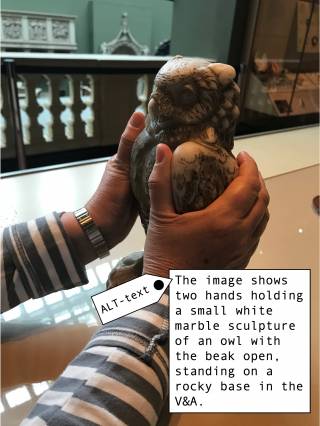
Links
Award : £2168.79
Image: A visitor handling a marble owl sculpture in the V&A Cast Courts © Rafie Cecilia
Counter mapping diaspora and queer communities’ living heritage in Sheffield
Dr Catalina Ortiz, UCL Development Planning Unit, Prof Kalliopi Fouseki, UCL Institute for Sustainable Heritage and Dr Natalia Villamizar Duarte, UCL Development Planning Unit
Team:
Dr Giorgio TalocciL & aia Garcia Fernandez, UCL Development Planning Unit
Akil Scafe-Smith & Seth Scafe-Smith, Resolve Collective
Rob J Cotterell, SADACCA
Katie Mathews, Gut Level
Official heritage sites, narratives and archives often reproduce and reinforce heteropatriarchal and racist assumptions. As we reckon with racial justice and gendered oppressions, this project will use a counter mapping approach to reveal the living heritage of diaspora and queer communities in Sheffield. We use counter mapping to expose broader relations of power and collaboration within, and between, communities as well as with other urban actors. We seek to challenge logics of ordering and fixed geographies by documenting experiences, practices, and relations that are at the centre of the production of space.
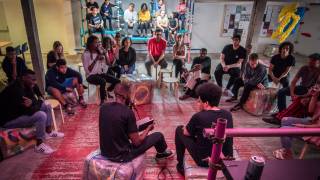
To display the cultural richness and contributions of diaspora and queer communities to the city, we will produce a digital atlas of living heritage and a mobile analogue artifact to display the counter mapping proposals. We will also document the project’s methodological strategy to contribute to examining the traditional roles of experts in identifying and defining heritage and the use of creative and participatory processes to trace living heritage practices.
Links
- Visit BUDD program, BUDD Facebook or BUDD Instagram
- Look up the following Twitter accounts: @DPU_BUDD, @cataortiza, @KFouseki, @natavillamizard, @giorgiotalocci , @laiagafe, @AkilScafeSmith, @seth_resolve
- Check the profiles of Dr. Catalina Ortiz, Prof Kalliopi Fouseki
- Go to Resolve Collective, Facebook or Instagram
- Explore Sadacca and their Facebook webpage & Gut Level
Award : £2700.44
Photo: © Resolve Collective
Crafting Subversion: an exhibition at the SOAS Brunei Gallery from 21 April-25 June 2022
Jagjeet Lally, UCL History & Pragya Dhital, Former IAS-UCL Visiting Fellow
Crafting subversion, a two-month exhibition in SOAS’s Brunei Gallery celebrating Indian radical print and the London émigré ‘origins’ and global spread of the cyclostyle technology used to produce it (the ‘Gestetner’ – as the best-known example of this technology in Britain is known, after its Tottenham-based Hungarian-Jewish inventor). Originally invented as a bureaucratic technology, to facilitate office work, the potentialities of this simple handheld duplicating technology were quickly grasped by those involved in underground print production across the world (from zines to samizdat).
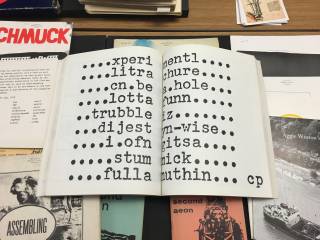
Pragya has been planning this exhibition since 2018, when she first approached the Brunei Gallery with ideas based on her research on the Indian emergency and proscribed publications in colonial India. The latter was the focus of a previous IAS-UCL conference, Insurgency in the Archives (2018), proceedings of which were published in a special section of History Workshop Journal (2020).
The project will encourage more imaginative forms of engagement with a wider range of archival material, inspired by the craft of Indian writers and media artists.
Links
- Go to Crafting Subversion: Resistance and underground publishing in India at the Brunei Gallery
- Revisit Insurgency in the Archives cconference
- Look up the Reading Group
- Check out the special section of History Workshop Journal
Award : £4000
Photo: © a selection of cyclostyled magazines from UCL's Small Press collection
Decolonising UCL: what to do about Phineas?
Emilia Kingham, UCL Culture & Jill Saunders, UCL Institute of Archaeology
Co-convener: Yee Hang Merry Chow, Aparna Dhole, Hadas Misgav, Dean Sully & Freya Sackville West,UCL Institute of Archaeology
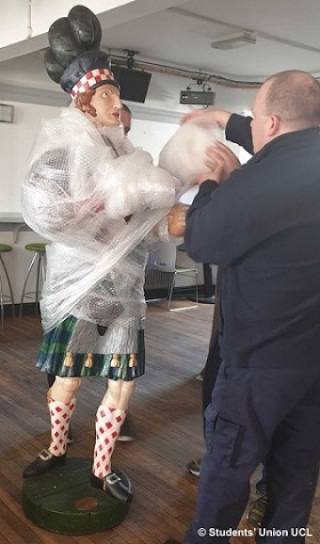
Links
Check out the following websites:
- Statue must fall movement in Oxford and Harvard Political Reviews
- History about Phineas from UCL Students' Union & British Pathe Cinema archives
- SU Announcement about Phineas removal
- Contested histories/decolonising heritage in the House of Commons Library, International Bar Association and Museum Association
- Decolonising UCL : Inquiry into the History of Eugenics at UCL and Making Difference
Award : £2193
Image: © Students'Union UCL
Tracing the everyday sensory heritage of Kolkata streets
Raktim Ray, PI, Lecturer, Bartlett Development Planning Unit, UCL, UK
Rishika Mukhopadhyay, Co I, Teaching Fellow, Department of Geography, Durham University
Sayantan Das, Co I, Assistant Professor, Dum Dum Motijheel College, Kolkata, India
Nilanjan Das, Co I, Independent Artist and Trustee Hamdasti Artist Collective, Kolkata, India
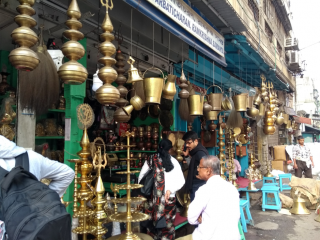
The project speaks directly to the larger research theme of ‘Curating the city’ in the Centre for Critical Heritage Studies. It decentres the idea of urban heritage production from built heritage sites to people’s everyday sensory attachment with the city. Creative modes of engagement and participatory mapping with a wide range of communities from Kolkata place this project within the cutting-edge research frontiers of critical heritage studies.
Outcomes
• Creation of a generative open-ended web-based archive of the smell and sound of the urban ordinary
• A walking tour of the street-based exhibition
• Making of pamphlets and brochures involving the public to rethink the multi-layered urban heritage
• A collaborative research article on the methodology of creating an open-ended archive
• The project will be a pilot study for the preparation of an AHRC grant application on urban living heritage in the postcolonial context
Links
- Follow the leaders of this project on Twitter: @raktimplan; @rishika_mukherj; @sayantdas
- Check out Hamdasti Artist Collective
Award : £2168.79
Photo: A Traditional Brass Utensils Shop in Chitpur Road © Rishika Mukhopadhyay
Guarani and Kaiowá Virtual Museum: Collaborative Approaches to Critical Heritage
Raffaella Fryer-Moreira | PhD Researcher at UCL Anthropology / Cofounder and Director of UCL Multimedia Anthropology Lab
Jaqueline Aranduhá | Member of Kuñangue Aty Guasu - The Great Assembly of Guarani and Kaiowá Women
Doriano Morales Arce | Member of Retomada Aty Jovem - The Guarani and Kaiowá Youth Council
Luan Iturve | Member of Retomada Aty Jovem - The Guarani and Kaiowá Youth Council
Fabiana Assis Fernandes | President of the Institute for the Development of Art and Culture
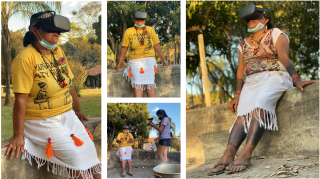
This global collaboration draws together members of Guarani and Kaiowá communities - both shamans/elders and local youth - with the interdisciplinary team of postgraduate students that make up the UCL Multimedia Anthropology Lab (UCL MAL), including anthropologists, artists, computer scientists, geographers, historians, translators, among others. The project builds on an 18 month period of research and development which took place through a series of pilot projects in 2021, supported by the British Museum’s Endangered Material Knowledge Programme, UCL Grand Challenges, and UCL Global Engagement. Thanks to support from the Centre for Critical Heritage Studies Small Grants, this year the project aims to finalise the VR production process and present the Guarani and Kaiowá Virtual Museum to a global audience. Over the next few months, the interdisciplinary team at UCL MAL will work closely with Guarani and Kaiowá community members to incorporate community feedback and include additional content into the VR space, experimenting with AI and interactive coding, in order to finalise a VR experience which will be made available to the public both through an online website and on VR streaming platforms. We aim to present a summary of project findings through the publication of a photo book, a mini-doc/ project video, and an online panel event with the participation of distinguished academic speakers and members of the community.
Links
Project Videos: https://www.youtube.com/watch?v=HbDnXX5HPqw
UCL MAL Website: https://www.uclmal.com/virtual-museum
Article about the project: https://anthropolitan.org/2021/05/13/decolonising-the-digital-collaborative-approaches-to-virtual-heritage
British Museum's EMKP Project Page: https://www.emkp.org/oga-pysy-guarani-and-kaiowa-ceremonial-houses-in-mato-grosso-do-sul-brazil/
UCL MAL Instagram: https://www.instagram.com/ucl_mal/
Kuñangue Aty Guasu Website: www.kunangue.com
Kuñangue Aty Guasu Instagram: https://www.instagram.com/kunangueatyguasu/?fbclid=IwAR1UQfoJl5EEjBusnVXCS29n5swb8aMF_MjSkrj7XPV3_dHzDIO0k2-wUd0
Award : £3750
Photo: Shamans Dona Ivone and Dona Neuza watch VR Museum © Raffaella Fryer-Moreira
 Close
Close

